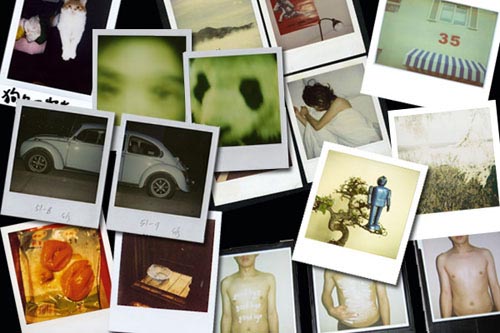Polaroid
Time:2009/07/01-2009/07/19
Address:Platform China Contemporary Art Institute (Beijing)
Artists:CHOU Xiaofei , LU Tingting , HU Xiaoyuan , HUANG Xiaolu , SU Wenxiang , YANG Dawei , DU Jie , G.Y , GE Lei , MENG Ke , PENG Yangjun , CHEN Jiaojiao , WU Penghui
Artists: Du Jie, G.Y, Ge Lei, Huang Xiaolu, Meng Ke, Peng Yangjun & Chen Jiaojiao, Qiu Xiaofei & Hu Xiaoyuan, Su Wenxiang, Wu Penghui, d-N(Yang Dawei & Lu Tingting)
Curator: Qiu Xiaofei
When the digital era arrives, family photos gradually become the “Only Existing Copy” of time and images with the loss of films and the damagment of photo papers. Meanwhile, these fragile papers slowly stand apart from their identity of image’s accessories, and the characteristics as an independent object clear up. The process that a piece of paper with images printed on it transformed into an “object” together with images and faded traces is slowly evolved over time. What different is, at the beginning of time, before taking a photo, Polaroid’s identity as an “object” was made clear.
Platform China is pleased to present its next exhibition in 2009 on July 1st - Polaroid,a group exhibition curated by Qiu Xiaofei with 13 young artists will demonstrate their creative works or moment as the medium of using Polaroid.
When the digital era arrives, family photos gradually become the “Only Existing Copy” of time and images with the loss of films and the damagment of photo papers. Meanwhile, these fragile papers slowly stand apart from their identity of image’s accessories, and the characteristics as an independent object clear up. The process that a piece of paper with images printed on it transformed into an “object” together with images and faded traces is slowly evolved over time. What different is, at the beginning of time, before taking a photo, Polaroid’s identity as an “object” was made clear. Firstly, no need to witness time and wars, it’s indeed “Only Existing Copy”; Secondly, when Edwin Hland invented Polaroid, he had a purpose of having an “instant photograph”. However, this simplicity has also brought many problems which could not be resolved. For example, the aperture and shutter cannot be controlled precisely, so that the photo is either over-exposure or too dark, and also the machine and the color warm cause the images to get stuck and develop uneven. But these imperfections had become the unique aesthetic characteristics; mysteriously keep a distance from the photographed object, making the images more independent above its accessories attribute.
What coexists with the object-oriented characteristics is that Polaroid charms people as a carrier of occasional motivation. Since Dadaism, “contingencies” as an original power of art has been accepted and led to a variety of forms. But it need only several seconds even less than one second for Polaroid from having a motive to see the result which can not be changed. Such short process in a large extent challenges the usual thoughtfulness and rational characters of art works. This means that no matter how we think, the ultimate moment is not fully predictable. Compared to other more occasional art forms, it’s not much radical. But as an image test set in a palm-size box, its significance has transcended the concept of the meaning of a photo; it weakly and softly opens out a convenient exit for the world that over rational and over-manipulated by human being’s brain.
We intuitively saw how those objects, persons and landscapes move and attach on another object through light, the miraculous transformation completed in the blink of an eye seems like it got the God’s help.
